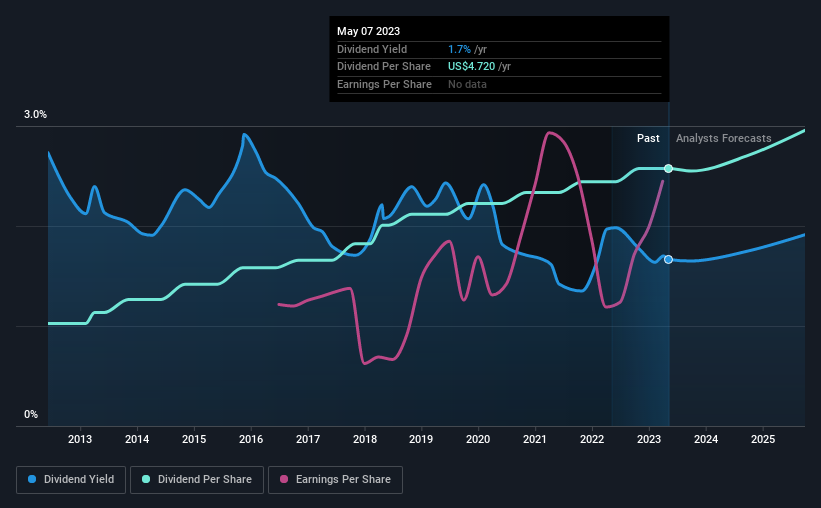Should You Buy Rockwell Automation, Inc. (NYSE:ROK) For Its Upcoming Dividend?
Readers hoping to buy Rockwell Automation, Inc. (NYSE:ROK) for its dividend will need to make their move shortly, as the stock is about to trade ex-dividend. The ex-dividend date occurs one day before the record date which is the day on which shareholders need to be on the company's books in order to receive a dividend. It is important to be aware of the ex-dividend date because any trade on the stock needs to have been settled on or before the record date. Accordingly, Rockwell Automation investors that purchase the stock on or after the 12th of May will not receive the dividend, which will be paid on the 12th of June.
The company's next dividend payment will be US$1.18 per share. Last year, in total, the company distributed US$4.72 to shareholders. Based on the last year's worth of payments, Rockwell Automation stock has a trailing yield of around 1.7% on the current share price of $283.42. Dividends are a major contributor to investment returns for long term holders, but only if the dividend continues to be paid. As a result, readers should always check whether Rockwell Automation has been able to grow its dividends, or if the dividend might be cut.
See our latest analysis for Rockwell Automation
Dividends are usually paid out of company profits, so if a company pays out more than it earned then its dividend is usually at greater risk of being cut. That's why it's good to see Rockwell Automation paying out a modest 40% of its earnings. That said, even highly profitable companies sometimes might not generate enough cash to pay the dividend, which is why we should always check if the dividend is covered by cash flow. Over the last year it paid out 60% of its free cash flow as dividends, within the usual range for most companies.
It's positive to see that Rockwell Automation's dividend is covered by both profits and cash flow, since this is generally a sign that the dividend is sustainable, and a lower payout ratio usually suggests a greater margin of safety before the dividend gets cut.
Click here to see the company's payout ratio, plus analyst estimates of its future dividends.
Have Earnings And Dividends Been Growing?
Businesses with strong growth prospects usually make the best dividend payers, because it's easier to grow dividends when earnings per share are improving. Investors love dividends, so if earnings fall and the dividend is reduced, expect a stock to be sold off heavily at the same time. Fortunately for readers, Rockwell Automation's earnings per share have been growing at 12% a year for the past five years. Rockwell Automation is paying out a bit over half its earnings, which suggests the company is striking a balance between reinvesting in growth, and paying dividends. This is a reasonable combination that could hint at some further dividend increases in the future.
Another key way to measure a company's dividend prospects is by measuring its historical rate of dividend growth. In the past 10 years, Rockwell Automation has increased its dividend at approximately 9.6% a year on average. We're glad to see dividends rising alongside earnings over a number of years, which may be a sign the company intends to share the growth with shareholders.
To Sum It Up
Is Rockwell Automation worth buying for its dividend? Earnings per share have grown at a nice rate in recent times and over the last year, Rockwell Automation paid out less than half its earnings and a bit over half its free cash flow. It's a promising combination that should mark this company worthy of closer attention.
So while Rockwell Automation looks good from a dividend perspective, it's always worthwhile being up to date with the risks involved in this stock. To help with this, we've discovered 2 warning signs for Rockwell Automation that you should be aware of before investing in their shares.
A common investing mistake is buying the first interesting stock you see. Here you can find a full list of high-yield dividend stocks.
Have feedback on this article? Concerned about the content? Get in touch with us directly. Alternatively, email editorial-team (at) simplywallst.com.
This article by Simply Wall St is general in nature. We provide commentary based on historical data and analyst forecasts only using an unbiased methodology and our articles are not intended to be financial advice. It does not constitute a recommendation to buy or sell any stock, and does not take account of your objectives, or your financial situation. We aim to bring you long-term focused analysis driven by fundamental data. Note that our analysis may not factor in the latest price-sensitive company announcements or qualitative material. Simply Wall St has no position in any stocks mentioned.
Join A Paid User Research Session
You’ll receive a US$30 Amazon Gift card for 1 hour of your time while helping us build better investing tools for the individual investors like yourself. Sign up here

 Yahoo Finance
Yahoo Finance 
